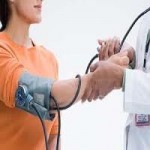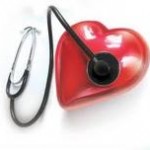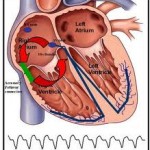Heart diseases have always been contributors to the world population’s demise.  These conditions meddle with the natural functions of the heart. As you know, the heart is your body’s pump. It enables the blood to circulate efficiently throughout your body. The unoxygenated blood gets to gather oxygen molecules from the lungs and the oxygenated blood gets to be circulated to the the different areas of your body.
Common signs and symptoms of a heart disease are fatigue, paleness, wet cough, pain, swelling of feet and ankles, numbness, feeling of indigestion, backache, anxiety, restlessness, difficulty eating, erectile dysfunction, lightheadedness, weakness, vomiting, and nausea. More serious ones are loss of pulse, cyanosis, angina, unconsciousness, excessive sweating, paleness, pain in shoulders, neck, jaw, and arms, shortness of breath, extreme dizziness, and severe swelling.
A heart disease can be caused by blockage of the blood vessels brought about by the buil up of hard plaque in the blood vessels (atherosclerosis); abnormal electrical conduction in the heart; birth defects; valve abnormalities of the heart; damage to the heart;Â and infections. You could be in high risk of acquiring heart diseases if:
- you are Native American, Hispanic American, and African American
- your family has a history of heart diseases
- you have hypertension
- you are an alcoholic
- the baby is exposed to diseases while in the mother’s womb
- the baby is exposed to toxins while in the womb
- you have a history of atherosclerosis and diabetes
- you have been experiencing stress for a long time
- you are a male
- you are postmenopausal over 45
- you are obese
- you smoke
- Â you have high cholesterol
Read this list of heart diseases so that you may be familiarized with them and perhaps discuss them with your doctor:
1. Heart attack (myocardial infarction)
 Heart attack is on e of the conditions in the list of heart diseases. It is caused by high cholesterol, high sodium, high sugar, Â low fiber diet that is very common in areas where people are very busy and need to eat from fast food restaurants. They also have no time to exercise anymore. A heart attack could either be sudden or during a very stressful activity. Â If you or a loved one is experiencing a heart attack, rest immediately and de-stress. At the same time, call the emergency number in your area.
Heart attack is on e of the conditions in the list of heart diseases. It is caused by high cholesterol, high sodium, high sugar, Â low fiber diet that is very common in areas where people are very busy and need to eat from fast food restaurants. They also have no time to exercise anymore. A heart attack could either be sudden or during a very stressful activity. Â If you or a loved one is experiencing a heart attack, rest immediately and de-stress. At the same time, call the emergency number in your area.
2. Hypertension
 Elevated blood pressure or hypertension also belongs to the list of heart diseases. It is commonly known as a traitor disease because people don’t get to know that they have it. You will only know that you have this condition if you undergo regular check ups. If you are already diagnosed with high blood pressure, it is best that you stay away from fatty, sugary, and salty foods. You should also avoid stress. Exercise is also one of the best ways to manage hypertension. Go to your doctor is your headache becomes persistent from the moment you wake up. It is usually accompanied by ringing in your ears, dizziness, and confusion.
Elevated blood pressure or hypertension also belongs to the list of heart diseases. It is commonly known as a traitor disease because people don’t get to know that they have it. You will only know that you have this condition if you undergo regular check ups. If you are already diagnosed with high blood pressure, it is best that you stay away from fatty, sugary, and salty foods. You should also avoid stress. Exercise is also one of the best ways to manage hypertension. Go to your doctor is your headache becomes persistent from the moment you wake up. It is usually accompanied by ringing in your ears, dizziness, and confusion.
3. Ischemic heart disease
 Ischemic heart disease is in the known list of heart diseases. It is where cardiac tissue receives less than appropriate amounts of oxygen. Chest pain in the left side of the chest area is the usual symptom of ischemic heart disease. You could correct this by exercising more and by watching what you eat.
Ischemic heart disease is in the known list of heart diseases. It is where cardiac tissue receives less than appropriate amounts of oxygen. Chest pain in the left side of the chest area is the usual symptom of ischemic heart disease. You could correct this by exercising more and by watching what you eat.
4. Heart rhythm disorders
 The list of heart diseases will not be complete without the heart rhythm disorders such as heart murmurs that are audible to your doctor with the use of a stethoscope. There may be times when heart murmurs are harmless but just to make sure that you’re okay, start exercising and living a healthy lifestyle.
The list of heart diseases will not be complete without the heart rhythm disorders such as heart murmurs that are audible to your doctor with the use of a stethoscope. There may be times when heart murmurs are harmless but just to make sure that you’re okay, start exercising and living a healthy lifestyle.
5. Tachycardia
 Tachycardia is a condition wherein your heart beats very fast. Its pace is higher than the average heart rate. This is in the list of heart diseases because this is a very detrimental and serious condition. You know you have tachycardia when you get dizzy, have shortness of breath, and palpitations. It’s normal for you to experience this right after a strenuous activity but if it lasts longer than twenty minutes, then you should do something about it or see your doctor. You should relax and breathe into a bad to make your heart beat slower.
Tachycardia is a condition wherein your heart beats very fast. Its pace is higher than the average heart rate. This is in the list of heart diseases because this is a very detrimental and serious condition. You know you have tachycardia when you get dizzy, have shortness of breath, and palpitations. It’s normal for you to experience this right after a strenuous activity but if it lasts longer than twenty minutes, then you should do something about it or see your doctor. You should relax and breathe into a bad to make your heart beat slower.
6. Rheumatic heart disease
 Rheumatic heart disease is in the list of heart diseases that is experienced by so many people. It results from the damage brought about by rheumatic flu. Signs and symptoms include chest pains, rashes, and fever. The valves of your heart do not function properly that is why the blood keeps on spilling to various areas of the heart. It would even result to heart failure.
Rheumatic heart disease is in the list of heart diseases that is experienced by so many people. It results from the damage brought about by rheumatic flu. Signs and symptoms include chest pains, rashes, and fever. The valves of your heart do not function properly that is why the blood keeps on spilling to various areas of the heart. It would even result to heart failure.
7. Pulmonary heart disease
 Pulmonary heart disease is a condition that involves the lungs. Here, insufficient pressure causes an abnormal flow of blood to that specific area. If you faint occasionally, experience chest pain, or have shortness of breath, then you are most likely to have this. You should immediately see your doctor so that the necessary curative steps may be performed.
Pulmonary heart disease is a condition that involves the lungs. Here, insufficient pressure causes an abnormal flow of blood to that specific area. If you faint occasionally, experience chest pain, or have shortness of breath, then you are most likely to have this. You should immediately see your doctor so that the necessary curative steps may be performed.
Prevention has always been better than cure. To keep your body safe from any of the conditions in the list of heart diseases, you should see to it that you have an ideal weight, you eat a balanced diet that is high in fiber and low in saturated fat, you don’t smoke or drink, you exercise regularly, and you avoid stress. Coordinate with your physician for the best guidance, diagnosis, and treatment options for your condition.
